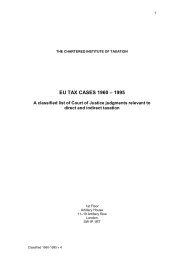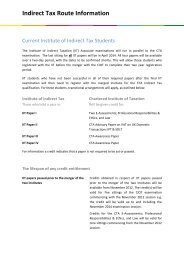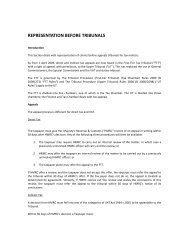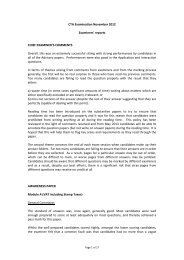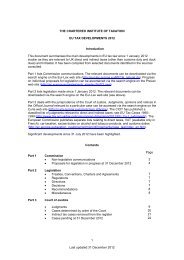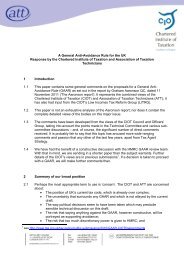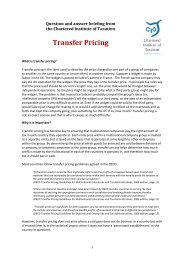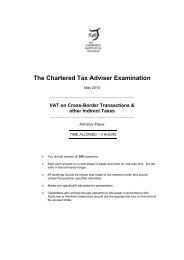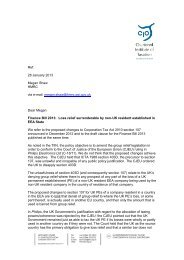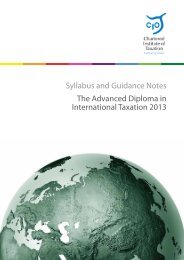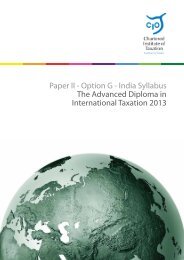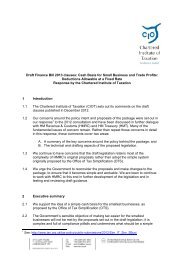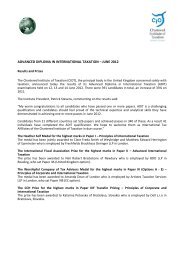A brief history of tax - The Chartered Institute of Taxation
A brief history of tax - The Chartered Institute of Taxation
A brief history of tax - The Chartered Institute of Taxation
You also want an ePaper? Increase the reach of your titles
YUMPU automatically turns print PDFs into web optimized ePapers that Google loves.
INAUGURAL LECTURE<br />
A <strong>brief</strong> <strong>history</strong> <strong>of</strong> <strong>tax</strong><br />
In this article based on her inaugural lecture, Jane Frecknall-Hughes looks at<br />
historical issues which have a bearing on <strong>tax</strong> today<br />
<strong>Taxation</strong> is not only fascinating in<br />
its own right academically, but has<br />
an everyday relevance that many<br />
other subjects may, indeed, lack. Tax is<br />
something that affects all our lives on a<br />
daily basis, yet knowledge <strong>of</strong> how <strong>tax</strong>es<br />
work or appreciation <strong>of</strong> their impact is not<br />
as common as one might wish.<br />
<strong>The</strong>re is in academia a general lack <strong>of</strong><br />
appreciation <strong>of</strong> the ways in which <strong>tax</strong>ation<br />
interacts with other academic subjects,<br />
as it is relevant in accounting and finance,<br />
public and local finance, law, economics,<br />
psychology, sociology, management,<br />
philosophy (especially ethics), political<br />
science and <strong>history</strong>. <strong>The</strong> last, together with<br />
law, form the focus <strong>of</strong> this article.<br />
For the the man on the Clapham omnibus,<br />
there is frequently a disconnect between the<br />
daily impact <strong>of</strong> <strong>tax</strong>ation and the Government<br />
policies underlying it, which we <strong>of</strong>ten<br />
become actively aware <strong>of</strong> only when they<br />
hit the media headlines. We certainly do<br />
not have a general consciousness <strong>of</strong> how<br />
we came to be where we are today or <strong>of</strong> the<br />
vast underlying back <strong>history</strong> <strong>of</strong> <strong>tax</strong>ation. By<br />
this term I refer not only to the <strong>history</strong> <strong>of</strong> the<br />
subject itself, but its inseparable effects on<br />
historical events and human behaviour.<br />
If we look back in time, we will see that<br />
as now, in the past, means and devices were<br />
employed that were driven by the nature <strong>of</strong><br />
the times and the art <strong>of</strong> what was possible,<br />
but nonetheless have a clear relevance and<br />
resonance for our current times.<br />
<strong>tax</strong> theory – a historical perspective<br />
When discussing <strong>tax</strong>es and <strong>tax</strong> theory, it<br />
is customary to refer to the four famous<br />
canons <strong>of</strong> <strong>tax</strong>ation outlined by Adam Smith<br />
in his work An Inquiry into the Nature and<br />
Causes <strong>of</strong> the Wealth <strong>of</strong> Nations (1776) as the<br />
defining characteristics <strong>of</strong> an effective <strong>tax</strong>.<br />
<strong>The</strong>se are equity/proportionality, certainty,<br />
convenience and efficiency, as follows:<br />
1. <strong>The</strong> subjects <strong>of</strong> every state ought to<br />
contribute towards the support <strong>of</strong> the<br />
Government, as nearly as possible, in<br />
proportion to the revenue which they<br />
respectively enjoy under the protection<br />
<strong>of</strong> the state. (Equity/proportionality,<br />
ie, contribution in accordance with a<br />
person’s ability to pay.)<br />
KeY pointS<br />
• Tax and <strong>tax</strong> avoidance go back into<br />
the dawn <strong>of</strong> democracy in the UK<br />
• Some <strong>of</strong> the issues we regard as<br />
modern problems in fact were also<br />
relevant 800 years ago<br />
• Looking back over the <strong>history</strong> <strong>of</strong> <strong>tax</strong><br />
can <strong>of</strong>fer some interesting parallels<br />
for the modern observer – and maybe<br />
some lessons<br />
2. <strong>The</strong> <strong>tax</strong> which each individual is bound to<br />
pay, ought to be certain, and not arbitrary.<br />
<strong>The</strong> time <strong>of</strong> payment, the manner <strong>of</strong><br />
payment, the amount to be paid ought to<br />
be plain and clear to the contributor and<br />
to every other person. (Certainty.)<br />
3. Every <strong>tax</strong> ought to be levied at the time,<br />
or in the manner, in which it is most likely<br />
to be convenient for the contributor to<br />
pay it. (Convenience – although ‘least<br />
degree <strong>of</strong> inconvenience’ might be a<br />
better way <strong>of</strong> putting this.)<br />
4. Every <strong>tax</strong> ought to be so contrived, as<br />
both to take out and to keep out <strong>of</strong> the<br />
pockets <strong>of</strong> the people as little as possible,<br />
over and above what it brings into the<br />
public treasury <strong>of</strong> the state. (Efficiency,<br />
that is, it does not cost more to collect the<br />
<strong>tax</strong> than the levy itself would produce.)<br />
To these four canons, which are still<br />
relevant today, has been added a fifth in<br />
more recent years, that <strong>of</strong> neutrality. This<br />
means that the <strong>tax</strong> system itself should<br />
influence as little as possible the way in<br />
which economic activities are carried out.<br />
In addition one would also hope to<br />
find that any <strong>tax</strong> system is flexible (ie,<br />
capable <strong>of</strong> being altered without too much<br />
difficulty to cope with changes in economic<br />
circumstances); is relatively simple to deal<br />
with and understand; and is perceived as<br />
being equitable by those upon whom it is<br />
imposed.<br />
However, we have to remember that<br />
these are ideals and in real life <strong>tax</strong>ation<br />
<strong>of</strong>ten has fallen far short <strong>of</strong> meeting them.<br />
Common themes emerging are problems<br />
<strong>of</strong> defining what is (or should be) <strong>tax</strong>ed,<br />
whether <strong>tax</strong> collection can be increased by<br />
decreasing the <strong>tax</strong> rate (the Laffer curve<br />
effect), the use <strong>of</strong> <strong>tax</strong>ation for non-fiscal<br />
purposes and to attempt to alter behaviour,<br />
<strong>tax</strong> protests, unintended consequences,<br />
Revenue discretion, evasion and avoidance –<br />
all <strong>of</strong> which, arguably, remain with us today.<br />
King John<br />
King John was nothing if not an innovative,<br />
extortionary and opportunistic <strong>tax</strong> collector.<br />
He was perennially short <strong>of</strong> funds, as the<br />
Treasury was depleted by the demands <strong>of</strong> his<br />
predecessor, Richard, in terms <strong>of</strong> overseas<br />
wars, building castles in contested French<br />
demesnes and the ransom demanded for his<br />
release.<br />
However, John’s <strong>tax</strong> measures succeeded<br />
in the early years <strong>of</strong> his reign because he<br />
had one <strong>of</strong> the ablest financial advisers that<br />
England has ever produced, a largely unsung<br />
hero by the name <strong>of</strong> Hubert Walter, who<br />
combined the role <strong>of</strong> Chancellor (<strong>of</strong> the<br />
Exchequer) and Archbishop <strong>of</strong> Canterbury,<br />
and had been head <strong>of</strong> the legal system as<br />
it then was. He not only controlled John,<br />
but also national finances until his death in<br />
1205, and had done so under Richard, and<br />
Richard’s and John’s father, Henry II. He was<br />
particularly good at amending <strong>tax</strong>es to which<br />
people were accustomed, to obtain more<br />
money but without causing undue unrest,<br />
and apparently with a reasonable degree<br />
<strong>of</strong> equity. Some <strong>of</strong> the <strong>tax</strong>es that existed at<br />
that time we would not today consider as<br />
22 January 2012 | www.<strong>tax</strong>advisermagazine.com
INAUGURAL LECTURE<br />
their power to bear it and to revolt, when<br />
the restraining influence <strong>of</strong> Hubert Walter<br />
was no longer there. John inherited a<br />
nearly bankrupt kingdom, depleted by his<br />
predecessor and made worse by wars in his<br />
own reign which the right financial advice<br />
from the right man in the right place at the<br />
right time was on the way to rectifying by<br />
extending the use <strong>of</strong> customary measures,<br />
not introducing new ones which would<br />
create disharmony. <strong>The</strong>se events resonate<br />
clearly for our own times.<br />
pr<strong>of</strong>iLe<br />
name Jane Frecknall-Hughes<br />
position Pr<strong>of</strong>essor <strong>of</strong> Law and Head <strong>of</strong> the Law School<br />
company <strong>The</strong> Open University<br />
tel 01908 332565<br />
email j.frecknall-hughes@open.ac.uk<br />
p r o fi l e Jane Frecknall-Hughes is currently Pr<strong>of</strong>essor <strong>of</strong> Law and Head<br />
<strong>of</strong> the Law School at <strong>The</strong> Open University, to which post she was appointed from 1<br />
December 2011, to lead forward the School’s research, scholarship and teaching. This<br />
article summarises Jane’s recent inaugural pr<strong>of</strong>essorial lecture in her previous post as<br />
Pr<strong>of</strong>essor <strong>of</strong> Accounting at <strong>The</strong> Open University. This is based on her research, which<br />
centres on <strong>tax</strong>ation with <strong>tax</strong>ation <strong>history</strong> being a particular interest.<br />
<strong>tax</strong>es, but it is common to consider any input<br />
into the royal Treasury at this time as a <strong>tax</strong>,<br />
however derived.<br />
Walter’s death produced a crisis in<br />
<strong>tax</strong>ation, in that Walter’s restraining<br />
influence on John’s rapaciousness was lost,<br />
leading to extreme <strong>tax</strong>ation measures.<br />
Desperate for money, John lost no time,<br />
following a disagreement with Rome, in<br />
seizing church property. Crown envy <strong>of</strong> the<br />
church’s wealth was nothing new, although<br />
monarchs generally exercised a degree <strong>of</strong><br />
restraint. John then sold their property back<br />
to the clergy, while retaining some part <strong>of</strong><br />
the church revenues as an income stream.<br />
<strong>The</strong> revenue John obtained from church<br />
sources undoubtedly meant that he did not<br />
ask for so much from the barons, and so<br />
deferred the <strong>tax</strong> revolt which led to Magna<br />
Carta. Over half the clauses in the 1215<br />
version <strong>of</strong> Magna Carta, incidentally, refer to<br />
John’s financial exactions.<br />
Another scheme was also devised for<br />
relieving the clergy <strong>of</strong> substantial sums <strong>of</strong><br />
money. Although priests were supposed to<br />
be celibate, the Church had great difficulty<br />
in enforcing this, and many parish priests,<br />
it is believed, had undergone some form<br />
<strong>of</strong> marriage, or kept housekeepers, who<br />
were rather more than this. Henry I had<br />
fined the clergy for disobeying the Church<br />
in this matter – at the same time as selling<br />
them licences to do so. John ordered all<br />
the clergy’s womenfolk <strong>of</strong> this nature to be<br />
seized and held for ransom.<br />
From the <strong>tax</strong> events <strong>of</strong> John’s reign in<br />
general, it is easy to see how economic<br />
hardship led to people being <strong>tax</strong>ed beyond<br />
moving forward in time<br />
Often the habits <strong>of</strong> society at large provide<br />
the means by which <strong>tax</strong>es can be raised,<br />
for example, because people drink, smoke,<br />
drive cars, travel by air, etc. A Government<br />
may be faced with <strong>tax</strong>ing something that is<br />
widespread (leading to a broad <strong>tax</strong> base, so a<br />
lot <strong>of</strong> people/things are <strong>tax</strong>ed) or expensive<br />
(leading to not so broad a <strong>tax</strong> base, but<br />
compensated for because <strong>tax</strong> is applied<br />
to higher cost base). An ideal ‘thing’ for a<br />
Government to <strong>tax</strong> is something which is<br />
both widespread and expensive, as this can<br />
raise a lot <strong>of</strong> <strong>tax</strong> revenue – but, as some <strong>of</strong><br />
my examples show, it has to be something<br />
that will last for a reasonable length <strong>of</strong> time.<br />
Typically ‘things’ are <strong>tax</strong>ed by the use<br />
<strong>of</strong> excise duties (or <strong>tax</strong>es). <strong>The</strong>se were<br />
particularly prevalent in England during the<br />
17th, 18th and 19th centuries.<br />
Excises are very flexible <strong>tax</strong>es, and have<br />
been popular for centuries in a wide variety<br />
<strong>of</strong> different countries. <strong>The</strong>ir advent in<br />
England and the English colonies in the 17th<br />
century is likely to be associated with the<br />
arrival <strong>of</strong> William <strong>of</strong> Orange, when he came<br />
to England from the Netherlands in 1689, as<br />
excises had gained great popularity at this<br />
time in Holland. <strong>The</strong> word ‘excise’ itself is<br />
derived from a Middle Dutch word (‘excijs’),<br />
one <strong>of</strong> the meanings <strong>of</strong> which is ‘assessment’.<br />
the 17th-century <strong>tax</strong> base<br />
Taxes were introduced on a variety <strong>of</strong> things<br />
(though some had existed before this in<br />
different forms):<br />
• salt (1694);<br />
• births, deaths and marriages; bachelors;<br />
sea-borne coal; spices, beer, wine, spirits,<br />
tea, c<strong>of</strong>fee, cocoa; and tobacco (1695);<br />
• windows (1696, lasting until 1851), also<br />
later, bricks and wallpaper;<br />
• trades via hackney carriages (1694) and<br />
hawkers (1697);<br />
• malt and leather (1697)<br />
• variously later – male servants, hair<br />
powder, soap, candles, hats and gloves.<br />
Bachelor <strong>tax</strong><br />
In times <strong>of</strong> economic crisis, Governments<br />
sometimes try to implement rather unusual<br />
measures.<br />
<strong>The</strong> so-called ‘bachelor <strong>tax</strong>’ was one<br />
<strong>of</strong> these <strong>tax</strong>es. More formally, it was part<br />
www.<strong>tax</strong>advisermagazine.com | January 2012 23
INAUGURAL LECTURE<br />
<strong>of</strong> the Marriage Duty Tax, authorised in<br />
England by an Act <strong>of</strong> Parliament in 1694 and<br />
implemented in 1695, which levied <strong>tax</strong> on<br />
marriages, births and burials, but also upon<br />
bachelors and widowers. It was imposed<br />
initially for five years, and then prolonged to<br />
1706, after which it was not renewed.<br />
<strong>The</strong> background to the <strong>tax</strong> was again a<br />
severe shortage <strong>of</strong> Government revenue,<br />
on this occasion required to fight an almost<br />
constant war against the French during the<br />
reign <strong>of</strong> William III and his wife, Mary II.<br />
As the name <strong>of</strong> the Act implies, a <strong>tax</strong> was<br />
levied on all births, marriages and deaths. In<br />
addition, an annual fee was charged on all<br />
bachelors over 25 years <strong>of</strong> age and childless<br />
widowers. Rates varied according to the<br />
social status <strong>of</strong> the individual: the gentry<br />
and nobility, and anyone with a personal<br />
estate over £600, or an annual income <strong>of</strong><br />
£50, paid extra. Persons receiving alms<br />
were exempt. In England, it seems that an<br />
unmarried duke would pay a minimum <strong>of</strong><br />
£12 11s (in old money).<br />
To assess this <strong>tax</strong> and prevent evasion, it<br />
was necessary to have a complete listing <strong>of</strong><br />
the whole population. This was, in effect a<br />
census, as it listed names, family and marital<br />
status, and titles. <strong>The</strong> listings generated,<br />
first in the summer <strong>of</strong> 1695, are the most<br />
comprehensive <strong>of</strong> the English population that<br />
existed before the 1801 census.<br />
While one might think that a <strong>tax</strong><br />
on bachelors is unusual, it has <strong>of</strong>ten<br />
been implemented or suggested,<br />
as a strategy <strong>of</strong> Governments to<br />
encourage population growth and<br />
raise money at the same time.<br />
Augustus Caesar attempted to<br />
impose penalties (if not actual<br />
<strong>tax</strong>es) on the unmarried in 18 BC,<br />
as did the Spartans <strong>of</strong> ancient<br />
Greece. <strong>The</strong> latter preferred<br />
public humiliation, however,<br />
to money-raising: bachelors in<br />
Sparta were required to march<br />
around the public market in<br />
wintertime stark naked, while<br />
singing a song mocking<br />
their unmarried status.<br />
<strong>The</strong> Missouri<br />
legislature in the USA<br />
attempted to levy such a <strong>tax</strong> in 1820, as did<br />
the Russians under Peter the Great in 1702.<br />
Indeed, there has been a recent suggestion<br />
that it should be applied to wealthy Russian<br />
bachelors, as many <strong>of</strong> these are, apparently,<br />
unmarried. <strong>The</strong>re has been a similar<br />
suggestion, made in 2008, in Ireland in<br />
regard to unmarried men over 18 (in this case<br />
to re-establish the institution <strong>of</strong> marriage), so<br />
it has not gone away.<br />
Window <strong>tax</strong><br />
Moving on to consider the window <strong>tax</strong>,<br />
this was introduced in England and Wales<br />
in 1696. It was intended to <strong>tax</strong> people<br />
relative to their wealth, as demonstrated<br />
by the number <strong>of</strong> windows they had in their<br />
houses, and was always accepted as a proxy<br />
for income <strong>tax</strong>: the larger one’s house, the<br />
more windows it was likely to possess and<br />
so the wealthier one might be deemed to<br />
be. Income <strong>tax</strong> was then an unwelcome and<br />
controversial idea, as it would involve the<br />
disclosure <strong>of</strong> personal details about income<br />
to a Government authority, which was felt to<br />
be a gross intrusion – an idea which dogged<br />
income <strong>tax</strong> well into the early years <strong>of</strong> the<br />
20th century.<br />
On introduction, the window <strong>tax</strong><br />
consisted <strong>of</strong> a flat-rate house <strong>tax</strong> <strong>of</strong> two<br />
shillings per house and a variable <strong>tax</strong> relating<br />
Bachelors in Sparta were required to march around<br />
the public market in wintertime stark naked, while<br />
singing a song mocking their unmarried status<br />
to the number <strong>of</strong> windows (if there were<br />
more than ten windows). If a property<br />
had between ten and 20 windows, four<br />
shillings were due and if it had more than<br />
20, eight shillings were due. <strong>The</strong> number<br />
<strong>of</strong> ‘chargeable’ windows was variously<br />
amended later on. In 1778, a variable rate <strong>tax</strong><br />
replaced the flat-rate one, which depended<br />
on property value.<br />
As windows could be easily counted, the<br />
<strong>tax</strong> was regarded as non-intrusive and easy<br />
to assess. However, the <strong>tax</strong> was regarded as<br />
an impost on air and light, and when it was<br />
finally repealed, it was on health grounds.<br />
It was also relatively easy to avoid as when<br />
inspectors came into a district to count<br />
windows, house owners would brick them up<br />
before they arrived and then unbrick them<br />
when the inspectors left. Eventually many<br />
tired <strong>of</strong> this continual cycle and left some<br />
windows bricked up permanently – hence<br />
they can still be seen in this condition today<br />
in many English stately homes.<br />
Brick <strong>tax</strong><br />
Brick <strong>tax</strong> was introduced in 1784 during<br />
the reign <strong>of</strong> George III to help fund wars in<br />
America. Bricks were originally assessed to<br />
<strong>tax</strong> a rate <strong>of</strong> four shillings per thousand. To<br />
try to get round this, manufacturers simply<br />
made larger bricks, which resulted in the<br />
introducing a maximum volume for a brick <strong>of</strong><br />
150 cubic inches (2,500cm 3 ).<br />
Two effects <strong>of</strong> this <strong>tax</strong> were that many<br />
smaller manufacturers went out <strong>of</strong> business<br />
(they had to sell their inventory to pay their<br />
<strong>tax</strong>es), and that architectural styles changed,<br />
with a return to the use <strong>of</strong> wood in house<br />
construction. <strong>The</strong> Government abolished<br />
the <strong>tax</strong> in 1850 as it was considered an<br />
impediment to industrial growth.<br />
Soap <strong>tax</strong><br />
In England, there is evidence <strong>of</strong> soap<br />
production in Bristol and Cheapside in<br />
London from the 12th, 13th and 14th<br />
centuries respectively. Soap was <strong>tax</strong>ed<br />
because it was expensive, and so provided<br />
a good source <strong>of</strong> revenue – although few<br />
people apparently washed (believing that<br />
dirt actually kept out harmful diseases and<br />
germs). During the wars against Napoleonic<br />
France, soap <strong>tax</strong> increased so much that <strong>tax</strong><br />
inspectors would lock up the soap boiling<br />
pans to stop illegal production at night. This<br />
<strong>tax</strong> was repealed in 1835.<br />
Candle <strong>tax</strong><br />
In 1709 a <strong>tax</strong> was introduced on all English<br />
and imported candles, the rate on tallow<br />
candles being one halfpenny a pound, and on<br />
wax fourpence apound. <strong>The</strong>se amounts were<br />
doubled in 1711. <strong>The</strong> <strong>tax</strong> was unpopular and<br />
was repealed in 1831.<br />
Hats and gloves<br />
<strong>The</strong>re had long been rules as to who could<br />
wear a hat and what it might be made <strong>of</strong>,<br />
dating from medieval and feudal rules.<br />
Hats, helmets, etc, were indicative <strong>of</strong> social<br />
status and political connections (eg, in the<br />
form <strong>of</strong> livery).<br />
A hat <strong>tax</strong> as such existed from 1784–1811.<br />
Apparently England was renowned for the<br />
excellence <strong>of</strong> its hats – a trade helped to<br />
develop by the French imposing a <strong>tax</strong> on hats<br />
in 1690. By 1784 it was felt that the English<br />
hat trade likewise could support a <strong>tax</strong>.<br />
Hat retailers had to take out an annual<br />
licence and have ‘Dealer in hats by retail’<br />
written above their shop doors. Every hat<br />
sold bore a duty according to its sale price.<br />
This was collected by means <strong>of</strong> a stamped<br />
ticket which was fixed to lining in the<br />
crown <strong>of</strong> the hat. <strong>The</strong> hatter had to charge<br />
separately for the stamp on the customer’s<br />
bill. Inevitably, this led to questions <strong>of</strong> what<br />
a hat was, as this had never been defined.<br />
In 1767 a separate <strong>tax</strong> was imposed on a<br />
certain kind <strong>of</strong> straw hat, called a ‘chip’<br />
hat, but the fashion changed and the <strong>tax</strong><br />
collected was minimal. In 1804, however,<br />
duties were imposed on substances from<br />
which hats could be made, and on every<br />
sort <strong>of</strong> hat (pretty much any head covering).<br />
Perhaps rather surprisingly, this led to a<br />
‘black market’ trade in hats.<br />
24 January 2012 | www.<strong>tax</strong>advisermagazine.com
INAUGURAL LECTURE<br />
A similar duty was imposed on gloves<br />
and mittens between 1785 and 1794.<br />
Tax on toiletries 1786–1800, especially<br />
hair/wig powder<br />
Between 1786 and 1800, <strong>tax</strong>es were also<br />
imposed on a variety <strong>of</strong> perfumes, pastes,<br />
balsams, ointments, waters, tinctures, tooth<br />
powder, pomatum, etc. Perhaps one <strong>of</strong> the<br />
more unusual items eventually to be <strong>tax</strong>ed<br />
was hair powder. This could be made from<br />
various different substances, for example,<br />
ground starch – and it was common to add<br />
perfume and colouring (commonly powder<br />
was coloured blue, pink, violet or yellow,<br />
although <strong>of</strong>f-white was most popular).<br />
However, in 1795 the Government<br />
introduced a <strong>tax</strong> <strong>of</strong> one guinea a year<br />
payable by those who wished to wear a<br />
powdered wig or directly powder their<br />
hair, which was the death knell for an<br />
already moribund fashion.<br />
relevance for today<br />
Let us just pause for a moment in<br />
consideration <strong>of</strong> some <strong>of</strong> these more<br />
outlandish <strong>tax</strong> provisions to point to the<br />
relevance for the current day.<br />
<strong>The</strong> bachelor <strong>tax</strong> was an attempt to<br />
raise <strong>tax</strong> and influence behaviour. It did not<br />
work very well or for very long. Using <strong>tax</strong><br />
to influence behaviour is as controversial<br />
today as it was then. We are now, for<br />
example, encouraged by higher duties on<br />
alcohol to give up or reduce intake, the<br />
latter more actively, perhaps, in Scotland<br />
than England and Wales.<br />
<strong>The</strong> need for a census was an unintended<br />
consequence <strong>of</strong> the bachelor <strong>tax</strong>, as was the<br />
imposition <strong>of</strong> a maximum brick size resulting<br />
from the brick <strong>tax</strong>. Not all unintended <strong>tax</strong><br />
consequences are unwelcome, but some<br />
can be – for example, in recent times the<br />
10p <strong>tax</strong> rate problems and, perhaps, the<br />
increase in company registrations when the<br />
first £10,000 <strong>of</strong> company pr<strong>of</strong>its were freed<br />
from corporation <strong>tax</strong>.<br />
In terms <strong>of</strong> candles and soap, it seems<br />
that the Government gave up a <strong>tax</strong> which had<br />
a broad base and could raise considerable<br />
revenue, especially after the development <strong>of</strong><br />
soap mass production. Why? One suggestion<br />
might be an increasing concern for public<br />
health and a better appreciation <strong>of</strong> what<br />
contributed to it. Would it not have raised<br />
more revenue to have lowered the duty on<br />
soap, and thus collected more as it became<br />
more widely available? It is, in fact, rather<br />
difficult to find out very much about these<br />
<strong>tax</strong>es. <strong>The</strong>re is more about soap <strong>tax</strong>es on<br />
soap manufacturers’ websites than in any<br />
textbook that I have encountered.<br />
However, excise duties on the necessities<br />
<strong>of</strong> life had always been unpopular, which is<br />
why the excise on beer was so unwelcome.<br />
Beer was not drunk primarily because it was<br />
alcoholic (though that might have been an<br />
Box 1 – the <strong>tax</strong> advice Spectrum<br />
Tax Tax Tax Tax Tax Tax<br />
morale compliance planning avoidance ‘avoision’ evasion<br />
added bonus), but because it was safe to<br />
drink. <strong>The</strong> manufacturing process involved<br />
boiling so it was safer than water, which was<br />
<strong>of</strong>ten severely polluted. It was thus the drink<br />
<strong>of</strong> the poorer classes, not a luxury item.<br />
To provide a sound <strong>tax</strong> base, something<br />
that is <strong>tax</strong>ed has to endure and the <strong>tax</strong><br />
imposed has to be perceived as fair. <strong>The</strong><br />
<strong>tax</strong> on ‘chip’ hats, for example, ‘missed the<br />
<strong>tax</strong> boat’ and that on hair powder was too<br />
late by far to collect any really substantial<br />
amount <strong>of</strong> revenue. It was a desperate<br />
measure, again during the Napoleanic wars,<br />
to raise funds. Income <strong>tax</strong>, introduced only<br />
a few years afterwards in 1799, was a move<br />
towards a wider <strong>tax</strong> base – income – which<br />
while subject to fluctuation, would not be<br />
subject to fashion.<br />
avoidance<br />
Some <strong>tax</strong>es are, <strong>of</strong> course, easier to avoid<br />
or evade. We have seen this in terms<br />
<strong>of</strong> the window <strong>tax</strong> and the hat <strong>tax</strong>. <strong>The</strong><br />
Government’s campaign against <strong>tax</strong><br />
avoidance is well known. However, opinions<br />
<strong>of</strong> what is avoidance have varied over the<br />
years, although there seem to have been<br />
two basic ways in which the authorities<br />
have looked at avoidance – either by<br />
reference to where something has fallen<br />
on a spectrum, (See Box 1) or by the way<br />
something has ‘smelt’, that is, ‘fishy’. <strong>The</strong><br />
spectrum idea does actually appear to be<br />
the more modern idea. By spectrum, I mean<br />
what is shown above. One can decide where<br />
an acceptable point lies.<br />
<strong>The</strong> ‘smell’ or ‘sniff’ test appears to be<br />
older. In an article in the British Tax Review in<br />
1981, Ian Ferrier reports on a scheme in 1783<br />
devised to ‘get round’ the payment <strong>of</strong> a two<br />
pence Scot duty (a type <strong>of</strong> excise) payable in<br />
Glasgow on each pint <strong>of</strong> ale or beer brewed,<br />
brought in or sold in the city and suburbs,<br />
in the case <strong>of</strong> Magistrates and Town Council<br />
<strong>of</strong> the City <strong>of</strong> Glasgow v Messrs. Murdoch,<br />
Warren & Co 2 Paton 615 52. <strong>The</strong> brewers,<br />
based at Anderston, then far enough away to<br />
be considered as not in the city or suburbs,<br />
announced that they would cease to supply<br />
the city, and made a contract with a certain<br />
Mr Munro, who bought the beer and<br />
supplied it to customers from the Anderston<br />
premises. One is compelled to wonder<br />
why the brewers could not have done this<br />
themselves.<br />
<strong>The</strong> case was taken to the House <strong>of</strong> Lords,<br />
though it was then a somewhat different<br />
Acceptable point?<br />
body legally from that which it subsequently<br />
became. Lord Mansfield was the foremost<br />
judge, and had no qualms about judging<br />
this a scheme which should not be allowed,<br />
and ignored the ‘device <strong>of</strong> the intermediate<br />
contract with Munro’. It was a perfectly legal<br />
contract, but it smacked <strong>of</strong> what we would<br />
now call unacceptable avoidance.<br />
conclusion<br />
Many <strong>tax</strong> ideas and problems have been<br />
around for a very long time. I will conclude<br />
by looking <strong>brief</strong>ly at current environmental<br />
<strong>tax</strong>es on certain kinds <strong>of</strong> waste.<br />
<strong>The</strong> idea <strong>of</strong> such a <strong>tax</strong> is <strong>of</strong>ten to <strong>tax</strong><br />
the producer <strong>of</strong> waste to try to minimise<br />
the impact on the environment, and/or<br />
the costs <strong>of</strong> cleaning up. <strong>The</strong> RSPCA has<br />
suggested re-introducing a dog licence<br />
very much along these lines, although it is<br />
interesting to note that the last dog licence<br />
that existed was scrapped some time ago<br />
as being inefficient: it cost more to collect<br />
the <strong>tax</strong> than was raised.<br />
<strong>The</strong> Romans, however, got there a<br />
long time before we did, and, perhaps<br />
unsurprisingly, did it rather more effectively.<br />
In Rome, urine was collected from public<br />
toilets and used in tanneries and laundries.<br />
<strong>The</strong> ammonia it contained was needed to<br />
cure leather and bleach togas. Urine was<br />
similarly used, incidentally, many years<br />
later in the production <strong>of</strong> Scottish tweed.<br />
Thus we have waste products being put<br />
to use in a way that we now are only just<br />
beginning to emulate. In Sheffield, the city<br />
council, for example, is running a trial <strong>of</strong><br />
council vehicles powered by methane gas<br />
derived from sewage. <strong>The</strong> Romans, however,<br />
went a step further. <strong>The</strong>y not only actually<br />
used the waste material, but <strong>tax</strong>ed it. <strong>The</strong><br />
Roman emperor, Nero, levied a <strong>tax</strong> on urine<br />
collectors (not, incidentally, on its producers),<br />
which generated a substantial amount <strong>of</strong><br />
revenue. Vespasian, who was emperor<br />
after Nero, continued to collect the <strong>tax</strong>.<br />
Vespasian’s son, Titus, complained about the<br />
unpleasant nature <strong>of</strong> the <strong>tax</strong>, but Vespasian<br />
is alleged to have held al<strong>of</strong>t gold coins from<br />
the <strong>tax</strong> collected with the words, ‘tell me, my<br />
son, whether they smell’.<br />
further information<br />
References within this article can be<br />
viewed at: www.<strong>tax</strong>advisermagazine.<br />
com/ta/article/references-1018341<br />
www.<strong>tax</strong>advisermagazine.com | January 2012 25



